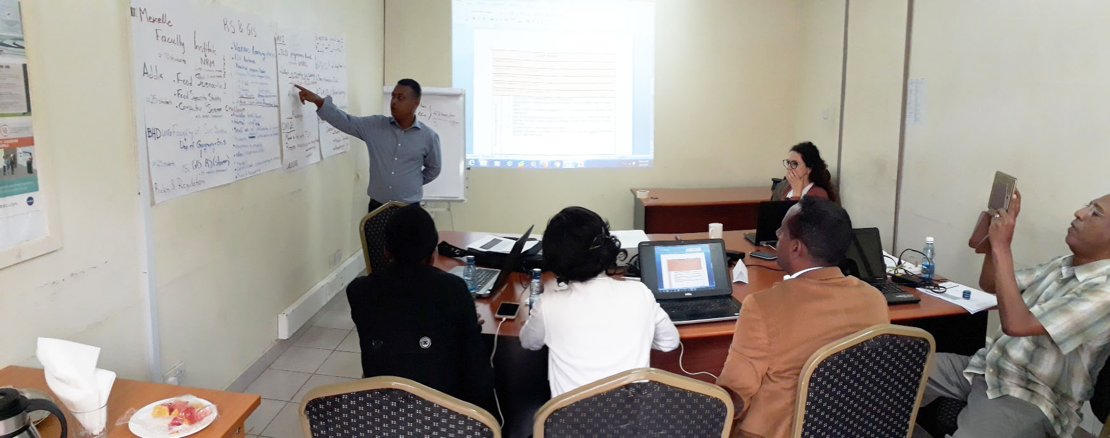One of the primary components of the EENSAT project is the improvement of the educational programs in place within partner Ethiopian universities to be more responsive to the job market and abreast of the fast evolving geo-information and earth observation sciences.
This can be achieved through a multifaceted approach of:
- strengthening the existing curricula,
- augmenting the organizational capacity of the partner universities’ education management , and
- upgrading the education management skill sets and know-how of academic staff to be able to deliver improved educational programs.
With respect to strengthening of existing curricula, a five-day training-of-trainers (ToT) on ‘Curriculum review and development’ was conducted the first week of June 2018 in Nairobi, Kenya to representatives from the three Ethiopian universities, namely, Addis Ababa University, Bahr Dar University and Mekele University. The ToT was delivered by Ing. Julia Levanti who has had extensive experience in curriculum review and design at ICT.

The overall objective of the ToT was curricula revision method through backwards course design based on the ‘Constructive Alignment’ method first described by Biggs (1999). It involved, in equal parts, both theoretical pedagogical concepts accompanied by simulated practical sessions. The practical sessions were based on real-world scenarios that reflect the curricula of the Ethiopian universities.
The lesson sessions covered a wide range of interlinked topics:
- Step-by-step curricula revision
- Design courses (using Blooms taxonomy)
- Mapping and redesigning of learning outcomes
- Active learning and teaching methods
- Assessment methods
- Designing of subject time-table
- Project based and blended learning
- Distance education.
Pursuant to the ToT, the trainees returned to their home universities and cascaded the same training to faculty members within their respective relevant academic programs as well as those officers within the universities engaged in curriculum standards and quality.
Currently, the partner Ethiopian universities are in the process of applying the skills and knowledge gained in reviewing their respective curricula in order to institute revisions that will make the courses and programs responsive the growing job market, sensitive to gender equity issues and cognizant of harnessing of learning management systems (LMS) to extend the reach of target students.

More recent news
 Tue 18 May 2021Training of trainers of TVET and Development Agents by BDU continues
Tue 18 May 2021Training of trainers of TVET and Development Agents by BDU continues Tue 27 Apr 2021Successful Training of Trainer approach implemented at Bahir Dar TVET
Tue 27 Apr 2021Successful Training of Trainer approach implemented at Bahir Dar TVET Thu 15 Apr 2021Tigray Bureau of Water Resources and Tigray Bureau of Health trained
Thu 15 Apr 2021Tigray Bureau of Water Resources and Tigray Bureau of Health trained Thu 1 Apr 2021Development Agents trained at BDU on GIS for Natural Resource Management
Thu 1 Apr 2021Development Agents trained at BDU on GIS for Natural Resource Management Thu 18 Mar 2021EENSAT features at MoSHE event
Thu 18 Mar 2021EENSAT features at MoSHE event
